European Commons Assembly
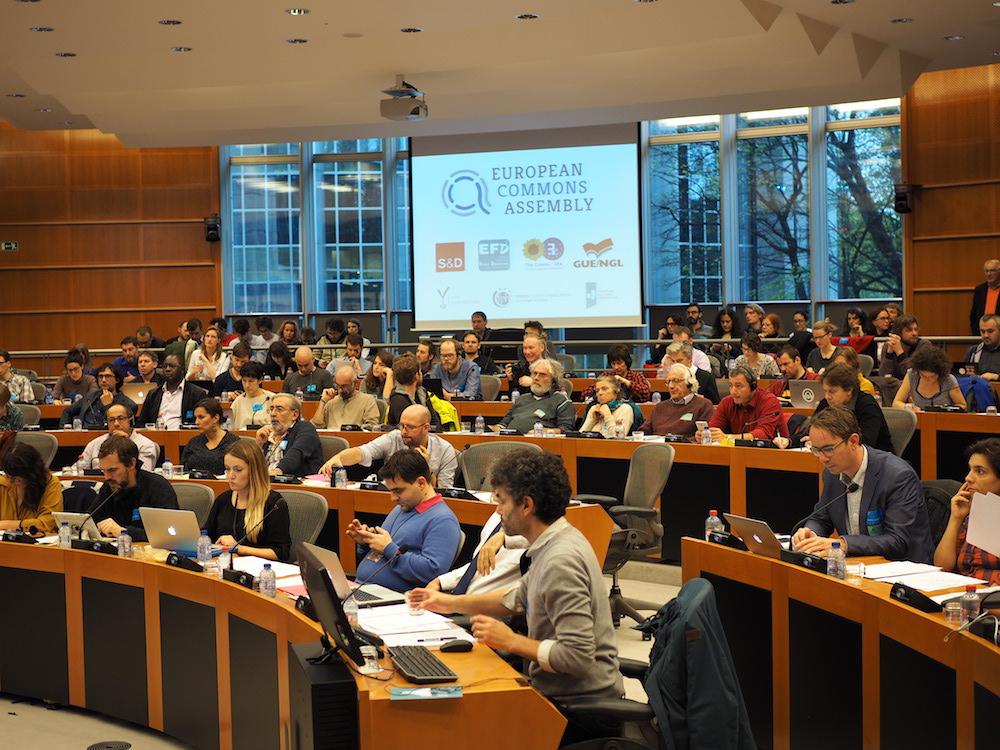
Prinzessinnengärten und Nachbarschaftsakademie haben im November zusammen mit über 150 Commonern aus 16 europäischen Ländern an der ersten European Commons Assembly in Brüssel teilgenommen. Um das Thema Commons / Gemeingüter auch auf der Gesetzgebungsebene der Europäischen Union zu verankern, gab es im Europäischen Parlament einen Austausch mit der fraktionsübergreifenden Intergruppe zum Thema common goods and public services.
 (mehr …)
(mehr …)
Commons Workshop in Zagreb
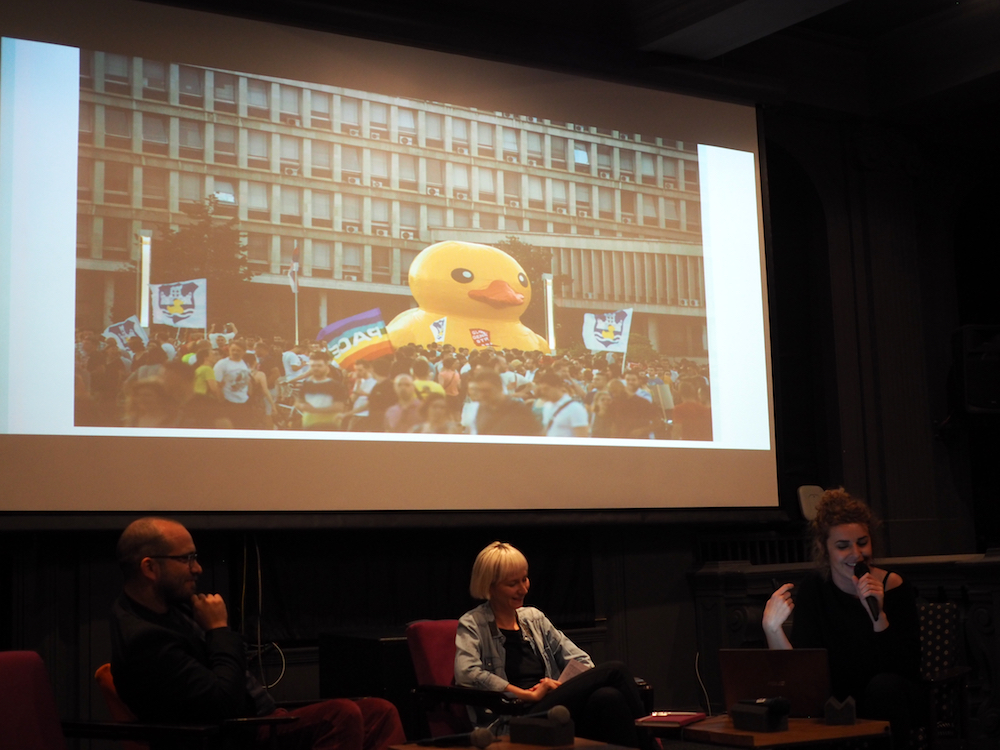
Auf Einladung des Institute for Political Ecology und der Green European Foundation hat die Nachbarschaftsakademie an dem Seminar „Urban Commons – Commoning the City“ in Zagreb teilgenommen.Mit dabei waren unter anderen Iva Čukić vom Ministarstvo prostora (Ministry of Space) und von Ne davimo Beograd (Don’tlet Belgrade drown), die zehntausende Menschen auf die Strasse bringen, um ein umstrittenes Investorenprojekt zu verhindern; Lucia Lois vom Sozialzentrum Patio Maravillas in Madrid, die die Geschichte des im letzten Jahr geräumten Zentrums dargestellt hat und die Veränderungen in der politischen Landschaft durch den Sieg des Wahlbündnisses Ahora Madrid, Alma Midžić von Crvena, die in Sarajewo gegen die Privatisierung des einzig öffentlichen Krankenhauses kämpfen; Matic Primc from INICIATIVA MESTNI ZBOR (IMZ), die offene Stadtteilversammlungen in 11 Bezirken Maribors organisieren. Daneben gab es zahlreiche lokale Initiativen, darunter Pravo na grad (Right to the City Zagreb) and parkticipacija. Letztere haben, auch inspiriert von Berliner Beispielen wie dem Allmende-Kontor und den Prinzessinnengärten, inzwischen schon 12 Gemeinschaftsgärten in Zagreb initiiert. (mehr …)
(mehr …)
Postponed
We just got the news that despite a big wave of support (17 000 people) a court ruled in favor of evicting the pilot project Agrocité / R-Urban to build of a temporary privat parking lot. We therefor unfortunately have to postpone the public event and the workshop with atelier d’architecture autogérée planned for the 14th and 15th of October.
We wish Doina and Constantin all the strength and solidarity they need. We are sure they will find a new way, a new place, and a lot of support and friends to continue the work.
The commons is, at its core, a very old – and a very new, recently rediscovered – system of governance for managing resources … In its largest sense, the commons is about stewardship of the things that we own in common as human beings. (David Bollier)
Building upon the practices of commons and commoning as a third way beyond the state and the market, this workshop aims at mapping existing practices as well as figuring out problems, potentials and methodologies.
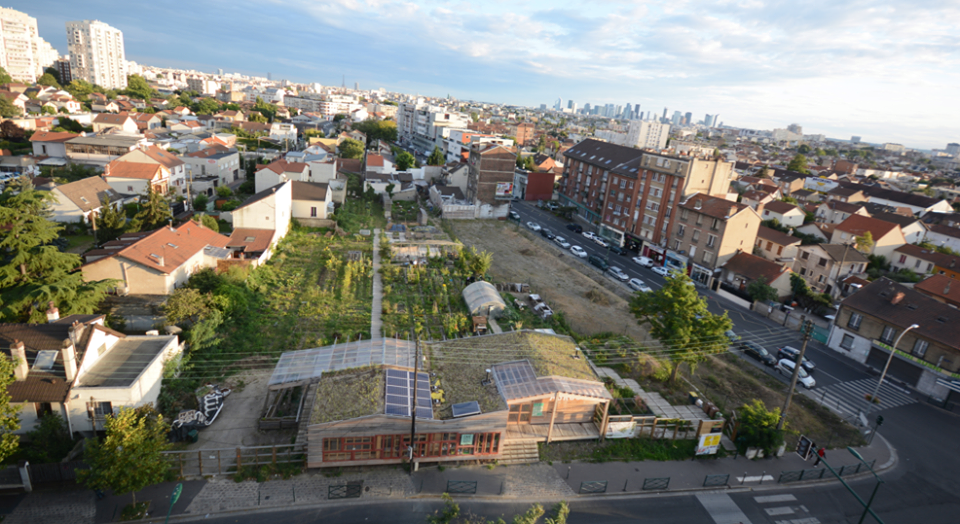
Foto: R-Urban in Colombes
In the workshop we will discuss the idea of the commons and try to understand how this can help to describe or frame practices of commoning in places like R-Urban, Prinzessinnengärten and other bottom-up projects. In the workshop we will refer to methodologies and strategies, which we and others worked with before – like the university course “The Common as Urban Topology” (Die Allmende als urbane Typologie) at the Technical University (TU, Berlin)1, the commons-project realised by Stadt von Unten (Berlin) and 596 Acres (New York) in the last year’s program at the Nachbarschaftsakademie, and the ongoing MAZI-project on local digital networks.
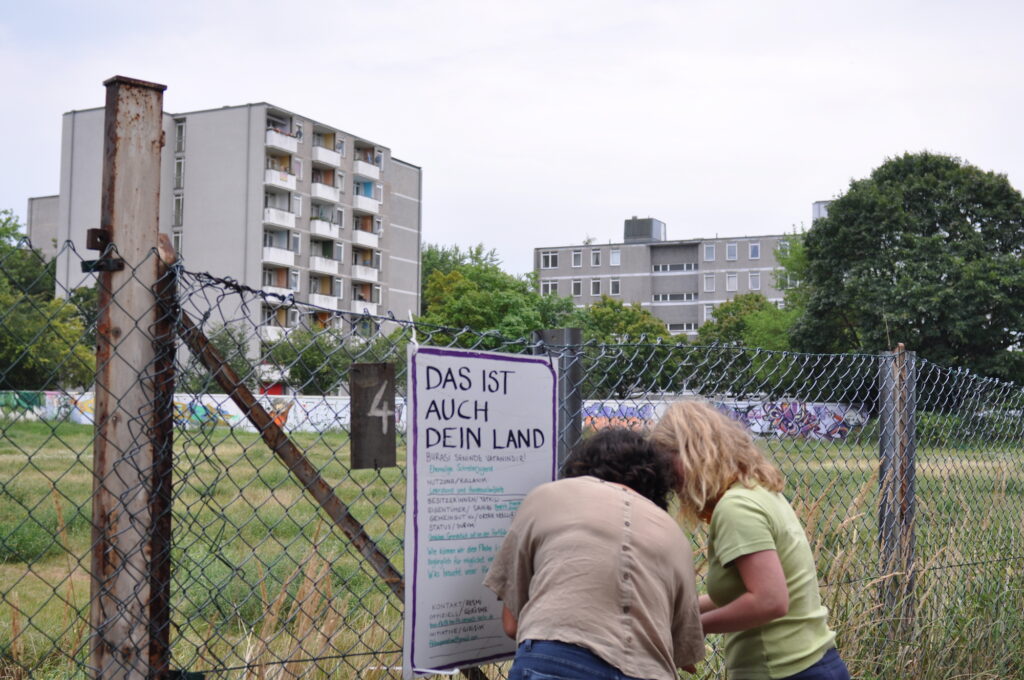
Making the commons visible. Collaboration of 596 Acres (New York) and Stadt von Unten in the Nachbarschaftsakademie 2015
The notion of commons is historically often referred to as a agricultural system of resource management during the feudal times in Europe, where peasants were living, farming and gleaning on the common land, which capitalism then enclosed and privatized. The commons is also used as a concept describing contemporary and disparate practices, including the self-organization of public squares as a new form of protest or the cyberspace as digital commons.
Because the commons is neither public nor private but defines another shared practice, it offers a possibility for analysis as well as for the elaboration of existing and potential practices beyond the logic of the market and the state. But how can this abstract notion work in concrete terms? We want to discuss how to identify or implement ideas and practices of commoning in specific locations.What concrete practices and arrangements can we imagine? What are the obstacles or contradictions? What are the examples we can refer to? How can we share experiences and the knowledge of commons and commoning?
If you want to take part in the workshop, please send us a mail to: nachbarschaftsakademie@prinzessinnengarten.net
The workshop is part of „Locating and Figuring Care and Commons in the Rurban Realm“. This project of common grounds / Nachbarschaftsakademie is made possible by Perspektive, a German-French fund for contemporary art and architecture initiated by the Bureau des arts plastiques (Institut français Deutschland) and the French embassy. In May of 2016 we took part in the Workshop Resilience en réseau at the Université Civique R-Urban in Paris.
Postponed
We just got the news that despite a big wave of support (17 000 people) a court ruled in favor of evicting the pilot project Agrocité / R-Urban to build of a temporary privat parking lot. We therefor unfortunately have to postpone the public event and the workshop with atelier d’architecture autogérée planned for the 14th and 15th of October.
We wish Doina and Constantin all the strength and solidarity they need. We are sure they will find a new way, a new place, and a lot of support and friends to continue the work.
The commons is, at its core, a very old – and a very new, recently rediscovered – system of governance for managing resources … In its largest sense, the commons is about stewardship of the things that we own in common as human beings. (David Bollier)
Building upon the practices of commons and commoning as a third way beyond the state and the market, this workshop aims at mapping existing practices as well as figuring out problems, potentials and methodologies.

Foto: R-Urban in Colombes
In the workshop we will discuss the idea of the commons and try to understand how this can help to describe or frame practices of commoning in places like R-Urban, Prinzessinnengärten and other bottom-up projects. In the workshop we will refer to methodologies and strategies, which we and others worked with before – like the university course “The Common as Urban Topology” (Die Allmende als urbane Typologie) at the Technical University (TU, Berlin)1, the commons-project realised by Stadt von Unten (Berlin) and 596 Acres (New York) in the last year’s program at the Nachbarschaftsakademie, and the ongoing MAZI-project on local digital networks.

Making the commons visible. Collaboration of 596 Acres (New York) and Stadt von Unten in the Nachbarschaftsakademie 2015
The notion of commons is historically often referred to as a agricultural system of resource management during the feudal times in Europe, where peasants were living, farming and gleaning on the common land, which capitalism then enclosed and privatized. The commons is also used as a concept describing contemporary and disparate practices, including the self-organization of public squares as a new form of protest or the cyberspace as digital commons.
Because the commons is neither public nor private but defines another shared practice, it offers a possibility for analysis as well as for the elaboration of existing and potential practices beyond the logic of the market and the state. But how can this abstract notion work in concrete terms? We want to discuss how to identify or implement ideas and practices of commoning in specific locations.What concrete practices and arrangements can we imagine? What are the obstacles or contradictions? What are the examples we can refer to? How can we share experiences and the knowledge of commons and commoning?
If you want to take part in the workshop, please send us a mail to: nachbarschaftsakademie@prinzessinnengarten.net
The workshop is part of „Locating and Figuring Care and Commons in the Rurban Realm“. This project of common grounds / Nachbarschaftsakademie is made possible by Perspektive, a German-French fund for contemporary art and architecture initiated by the Bureau des arts plastiques (Institut français Deutschland) and the French embassy. In May of 2016 we took part in the Workshop Resilience en réseau at the Université Civique R-Urban in Paris.
Postponed
We just got the news that despite a big wave of support (17 000 people) a court ruled in favor of evicting the pilot project Agrocité / R-Urban to build of a temporary privat parking lot. We therefor unfortunately have to postpone the public event and the workshop with atelier d’architecture autogérée planned for the 14th and 15th of October.
We wish Doina and Constantin all the strength and solidarity they need. We are sure they will find a new way, a new place, and a lot of support and friends to continue the work.
The commons is, at its core, a very old – and a very new, recently rediscovered – system of governance for managing resources … In its largest sense, the commons is about stewardship of the things that we own in common as human beings. (David Bollier)
Building upon the practices of commons and commoning as a third way beyond the state and the market, this workshop aims at mapping existing practices as well as figuring out problems, potentials and methodologies.

Foto: R-Urban in Colombes
In the workshop we will discuss the idea of the commons and try to understand how this can help to describe or frame practices of commoning in places like R-Urban, Prinzessinnengärten and other bottom-up projects. In the workshop we will refer to methodologies and strategies, which we and others worked with before – like the university course “The Common as Urban Topology” (Die Allmende als urbane Typologie) at the Technical University (TU, Berlin)1, the commons-project realised by Stadt von Unten (Berlin) and 596 Acres (New York) in the last year’s program at the Nachbarschaftsakademie, and the ongoing MAZI-project on local digital networks.

Making the commons visible. Collaboration of 596 Acres (New York) and Stadt von Unten in the Nachbarschaftsakademie 2015
The notion of commons is historically often referred to as a agricultural system of resource management during the feudal times in Europe, where peasants were living, farming and gleaning on the common land, which capitalism then enclosed and privatized. The commons is also used as a concept describing contemporary and disparate practices, including the self-organization of public squares as a new form of protest or the cyberspace as digital commons.
Because the commons is neither public nor private but defines another shared practice, it offers a possibility for analysis as well as for the elaboration of existing and potential practices beyond the logic of the market and the state. But how can this abstract notion work in concrete terms? We want to discuss how to identify or implement ideas and practices of commoning in specific locations.What concrete practices and arrangements can we imagine? What are the obstacles or contradictions? What are the examples we can refer to? How can we share experiences and the knowledge of commons and commoning?
If you want to take part in the workshop, please send us a mail to: nachbarschaftsakademie@prinzessinnengarten.net
The workshop is part of „Locating and Figuring Care and Commons in the Rurban Realm“. This project of common grounds / Nachbarschaftsakademie is made possible by Perspektive, a German-French fund for contemporary art and architecture initiated by the Bureau des arts plastiques (Institut français Deutschland) and the French embassy. In May of 2016 we took part in the Workshop Resilience en réseau at the Université Civique R-Urban in Paris.
Hidden Economies

Friland bei Aarhus
Asa Sonjasdotter und Marco Clausen haben die Nachbarschaftsakademie in dem Workshop community economies of food vorgestellt, der vom 30.6.-01.07.16 in Aarhus stattfand. Organisiert wurde der Workshop im Rahmen des Projektes hidden economies von Bonnie Fortune und Lise Skou, das inspiriert wird von den Arbeiten von JK Gibson-Graham (Julie Graham and Katherine Gibson). Mit dabei waren unter anderem das Project Cafe aus Glasgow, Feral Trade aus Bristol und Rude Food aus Malmö.
(mehr …)
Architekturseminar zur Laube

Die Studierenden des Architekturseminars an der TU-Berlin präsentieren ihre Entwürfe für Aussenhaut, Dächer, Möbel, Gärten und Regenwassernutzung der Laube
(mehr …)
Michelle Teran is in cooperation with the Neighborhood Academy organizing a workshop on reclaiming and right to the city movements, trying to understand them also as a form of collective learning. The results will be presented in a public performance.
Ankündigung in Deutsch unten auf der Seite
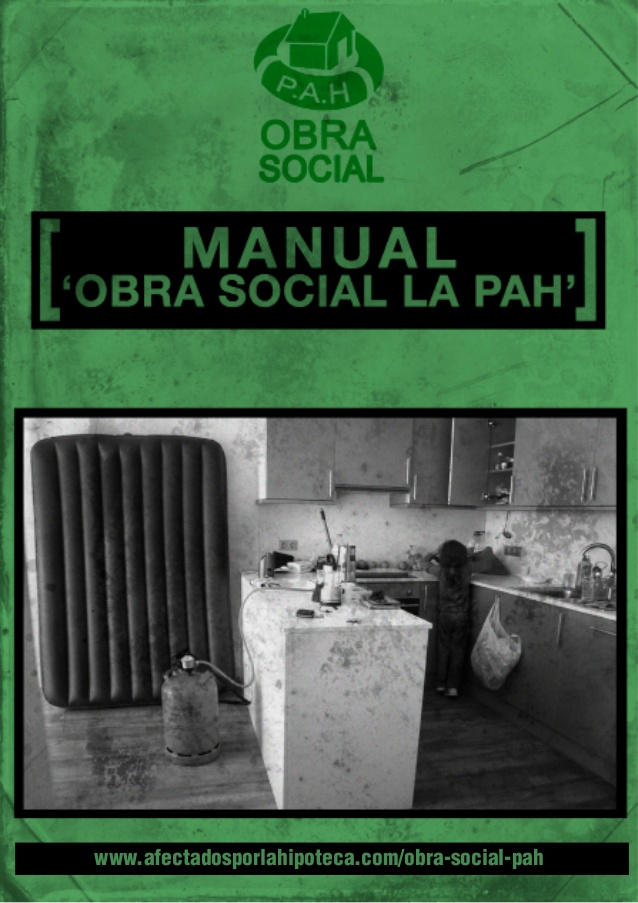
Presentation of the results of the workshop in a public performance
Thursday 11th of August, 8:30 – 9:30 pm
In the Reclaiming-Workshop, we will exchange models and strategies on the relations between places, materials and performative actions that are produced in the context of reclaiming. The workshop is part of the Neighborhood Academy program of 2016, which focuses on forms of collective learning. We will introduce participatory models and methodologies for collective learning developed inside and outside of Berlin (Paris, Madrid) which exercise collective power to reshape the process of urbanisation (Harvey, 2008), by using community toolkits that combine online and physical interactions. The focus will be an exchange and discussion of practical case studies, which provide the basis for the production of knowledge and ideological positions for grass-roots political and social movements against property speculation and privatization of public space.
We will present the results of the Reclaiming-Workshop publicly on Thursday 11th of August. This public event will present case studies introduced within workshop through the public and collective reading of manuals, manifestos, open letters, pamphlets and other materials produced by various grassroots initiatives and affinity groups connected by the fight for the right to the city, and strategies for reclaiming. The event is a space for sharing proposals and initiatives and new forms of collective action. The public act of reading is the act of making public the physical artifacts of ongoing activities, many times the only traces of a ceaseless flow of activity that often goes undocumented. This event proposes that the public reading and exchange of these materials creates a bridge for dialogue and collective knowledge, building up a public archive through the circulation of instructions and recipes for living.
Invited groups for the Workshop:
Stadt von Unten
Kotti & Co
Mietshäusersyndikat
Stille Straße
Bizim Kiez
Allmendekontor
100& THF
PAH / Obra Social
The workshop is being held by the Berlin and Madrid based artist Michelle Teran. Michelle claims a hybrid practice that links political and social involvement to contemporary art actions. Currently she is developing a series of works that examine crisis subjectivities within the scope of recent (post-2011) political movements. Since 2013 she has been closely connected to housing movement in Spain and produced films, materials and performances around the ongoing work of the Stop Desahucios (Stop Evictions) movement and the PAH.
***********
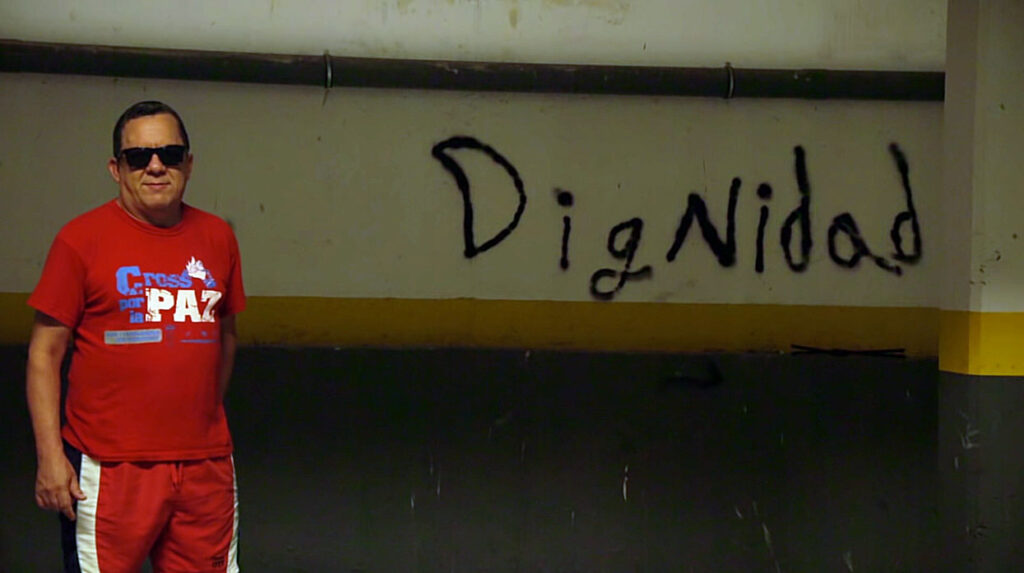
Aditionally we will present Michelle Teran’s new documentary DIGNIDAD / DIGNITY on the Spanish housing movement on 4th of August
*************
Einladung in Deutsch
Michelle Teran organisiert in Kooperation mit der Nachbarschaftsakademie einen Workshop zu den Themen reclaiming / Wiederaneignung und Recht auf Stadt. Wir wollen die mit diesen Fragen verbundenen Bewegungen dabei auch als eine Form kollektiven Lernens verstehen. Die Ergebnisse des Workshops werden in einer öffentlichen Performance präsentiert.

Öffentliche Präsentation der Ergebnisse des Reclaiming-Workshops
Donnerstag 11. August
Der Workshop soll dazu beitragen, sich zu Modellen und Strategien der Wiederaneignung auszutauschen. Es geht dabei um das Verhältnis zwischen Ort, publizierten Materialien und performativen Handlungen, die jeweils in solchen Prozessen von Wiederaneignungen entstehen. Der Workshop ist Teil des Programms der Nachbarschaftsakademie für 2016, das sich dem Thema kollektives Lernen widmet. Wir werden mit Hilfe von Beispielen von außerhalb Berlins (Paris, Madrid) partizipatorische Modelle und Methoden vorstellen, die zu einem kollektiven Lernprozess beitragen. Es geht um die „Ausübung kollektiver Macht zur Veränderung des Urbanisierungsprozesses“ (David Harvey), insbesondere durch community-basierte Handlungsstrategien, die digitale wie physische Interaktionen miteinander verbinden. Der Fokus wird auf dem Austausch und der Diskussion zu praktischen Fallbeispiele liegen. In ihnen werden Wissen und politischen Positionen für soziale und politische Graßwurzelbewegungen erarbeitet, die sich gegen Spekulation und Privatisierung richten.
Wir laden auch zu einem öffentlichen Event am Tag nach dem Workshop ein. Hier werden wir die im Reclaiming-Workshop bearbeiteten Fallbeispiele vorstellen. In Form einer kollektiven Lese-Performance werden Manuals, Manifeste, Öffentliche Briefe, Pamphlete und andere Materialien öffentlich präsentiert, die von Graswurzel-Initiativen und andere Gruppen aus der Recht-auf-Stadt-Bewegung produziert wurden. Die Veranstaltung ist eine Ort, um Vorschläge, Initiativen und neue Formen kollektiven Handelns miteinander zu teilen. Mit dem öffentliche Akt des Vorlesens sollen die physische Produkte von laufenden Aktivitäten öffentlich hörbar gemacht werden. Sie sind oftmals die einzigen Spuren eines nicht-dokumentierten Flusses von Aktivitäten. Mit der Veranstaltung wollen wir eine Brücke des Dialogs und kollektiven Lernens bauen und durch das öffentlichen Lesen und das Zirkulieren dieser Materialien zu einem lebendigen öffentlichen Archiv beitragen.
Zum Workshop eingeladene Gruppen:
Stadt von Unten
Kotti & Co
Mietshäusersyndikat
Stille Straße
Bizim Kiez
Allmendekontor
100& THF
PAH / Obra Social
Der Workshop wird organisiert von der in Madrid und Berlin lebenden Künstlerin Michelle Teran. Michelle arbeitet mit hybriden Praktiken, die politisches und soziales Engagement mit zeitgenössischen künstlerischen Arbeitsweisen verbinden. Derzeit entwickelt sie eine Serie von Arbeiten, die Krisen-Subjektivitäten im Kontext der jüngsten, nach 2011 entstandenen politischen Bewegungen untersuchen. Seit 2013 ist sie eng verbunden mit den Bewegungen zur Wohnungsfrage in Spanien und hat in diesem Zusammenhang Filme, Materialien und Performances zu Initiativen Stop Desahucios (Stop Zwangsräumungen) und PAH (Plataforma de Afectados por la Hipoteca, Plattform für die von Hypotheken Betroffenen) gemacht.
***********

Zusätzlich zeigen wir Michelle Terans Dokumentarfirm DIGNIDAD / Dignity am 4. August in der Nachbarschaftsakademie
Michelle Teran is in cooperation with the Neighborhood Academy organizing a workshop on reclaiming and right to the city movements, trying to understand them also as a form of collective learning. The results will be presented in a public performance.
Ankündigung in Deutsch unten auf der Seite

Presentation of the results of the workshop in a public performance
Thursday 11th of August, 8:30 – 9:30 pm
In the Reclaiming-Workshop, we will exchange models and strategies on the relations between places, materials and performative actions that are produced in the context of reclaiming. The workshop is part of the Neighborhood Academy program of 2016, which focuses on forms of collective learning. We will introduce participatory models and methodologies for collective learning developed inside and outside of Berlin (Paris, Madrid) which exercise collective power to reshape the process of urbanisation (Harvey, 2008), by using community toolkits that combine online and physical interactions. The focus will be an exchange and discussion of practical case studies, which provide the basis for the production of knowledge and ideological positions for grass-roots political and social movements against property speculation and privatization of public space.
We will present the results of the Reclaiming-Workshop publicly on Thursday 11th of August. This public event will present case studies introduced within workshop through the public and collective reading of manuals, manifestos, open letters, pamphlets and other materials produced by various grassroots initiatives and affinity groups connected by the fight for the right to the city, and strategies for reclaiming. The event is a space for sharing proposals and initiatives and new forms of collective action. The public act of reading is the act of making public the physical artifacts of ongoing activities, many times the only traces of a ceaseless flow of activity that often goes undocumented. This event proposes that the public reading and exchange of these materials creates a bridge for dialogue and collective knowledge, building up a public archive through the circulation of instructions and recipes for living.
Invited groups for the Workshop:
Stadt von Unten
Kotti & Co
Mietshäusersyndikat
Stille Straße
Bizim Kiez
Allmendekontor
100& THF
PAH / Obra Social
The workshop is being held by the Berlin and Madrid based artist Michelle Teran. Michelle claims a hybrid practice that links political and social involvement to contemporary art actions. Currently she is developing a series of works that examine crisis subjectivities within the scope of recent (post-2011) political movements. Since 2013 she has been closely connected to housing movement in Spain and produced films, materials and performances around the ongoing work of the Stop Desahucios (Stop Evictions) movement and the PAH.
***********

Aditionally we will present Michelle Teran’s new documentary DIGNIDAD / DIGNITY on the Spanish housing movement on 4th of August
*************
Einladung in Deutsch
Michelle Teran organisiert in Kooperation mit der Nachbarschaftsakademie einen Workshop zu den Themen reclaiming / Wiederaneignung und Recht auf Stadt. Wir wollen die mit diesen Fragen verbundenen Bewegungen dabei auch als eine Form kollektiven Lernens verstehen. Die Ergebnisse des Workshops werden in einer öffentlichen Performance präsentiert.

Öffentliche Präsentation der Ergebnisse des Reclaiming-Workshops
Donnerstag 11. August
Der Workshop soll dazu beitragen, sich zu Modellen und Strategien der Wiederaneignung auszutauschen. Es geht dabei um das Verhältnis zwischen Ort, publizierten Materialien und performativen Handlungen, die jeweils in solchen Prozessen von Wiederaneignungen entstehen. Der Workshop ist Teil des Programms der Nachbarschaftsakademie für 2016, das sich dem Thema kollektives Lernen widmet. Wir werden mit Hilfe von Beispielen von außerhalb Berlins (Paris, Madrid) partizipatorische Modelle und Methoden vorstellen, die zu einem kollektiven Lernprozess beitragen. Es geht um die „Ausübung kollektiver Macht zur Veränderung des Urbanisierungsprozesses“ (David Harvey), insbesondere durch community-basierte Handlungsstrategien, die digitale wie physische Interaktionen miteinander verbinden. Der Fokus wird auf dem Austausch und der Diskussion zu praktischen Fallbeispiele liegen. In ihnen werden Wissen und politischen Positionen für soziale und politische Graßwurzelbewegungen erarbeitet, die sich gegen Spekulation und Privatisierung richten.
Wir laden auch zu einem öffentlichen Event am Tag nach dem Workshop ein. Hier werden wir die im Reclaiming-Workshop bearbeiteten Fallbeispiele vorstellen. In Form einer kollektiven Lese-Performance werden Manuals, Manifeste, Öffentliche Briefe, Pamphlete und andere Materialien öffentlich präsentiert, die von Graswurzel-Initiativen und andere Gruppen aus der Recht-auf-Stadt-Bewegung produziert wurden. Die Veranstaltung ist eine Ort, um Vorschläge, Initiativen und neue Formen kollektiven Handelns miteinander zu teilen. Mit dem öffentliche Akt des Vorlesens sollen die physische Produkte von laufenden Aktivitäten öffentlich hörbar gemacht werden. Sie sind oftmals die einzigen Spuren eines nicht-dokumentierten Flusses von Aktivitäten. Mit der Veranstaltung wollen wir eine Brücke des Dialogs und kollektiven Lernens bauen und durch das öffentlichen Lesen und das Zirkulieren dieser Materialien zu einem lebendigen öffentlichen Archiv beitragen.
Zum Workshop eingeladene Gruppen:
Stadt von Unten
Kotti & Co
Mietshäusersyndikat
Stille Straße
Bizim Kiez
Allmendekontor
100& THF
PAH / Obra Social
Der Workshop wird organisiert von der in Madrid und Berlin lebenden Künstlerin Michelle Teran. Michelle arbeitet mit hybriden Praktiken, die politisches und soziales Engagement mit zeitgenössischen künstlerischen Arbeitsweisen verbinden. Derzeit entwickelt sie eine Serie von Arbeiten, die Krisen-Subjektivitäten im Kontext der jüngsten, nach 2011 entstandenen politischen Bewegungen untersuchen. Seit 2013 ist sie eng verbunden mit den Bewegungen zur Wohnungsfrage in Spanien und hat in diesem Zusammenhang Filme, Materialien und Performances zu Initiativen Stop Desahucios (Stop Zwangsräumungen) und PAH (Plataforma de Afectados por la Hipoteca, Plattform für die von Hypotheken Betroffenen) gemacht.
***********

Zusätzlich zeigen wir Michelle Terans Dokumentarfirm DIGNIDAD / Dignity am 4. August in der Nachbarschaftsakademie
Michelle Teran is in cooperation with the Neighborhood Academy organizing a workshop on reclaiming and right to the city movements, trying to understand them also as a form of collective learning. The results will be presented in a public performance.
Ankündigung in Deutsch unten auf der Seite

Presentation of the results of the workshop in a public performance
Thursday 11th of August, 8:30 – 9:30 pm
In the Reclaiming-Workshop, we will exchange models and strategies on the relations between places, materials and performative actions that are produced in the context of reclaiming. The workshop is part of the Neighborhood Academy program of 2016, which focuses on forms of collective learning. We will introduce participatory models and methodologies for collective learning developed inside and outside of Berlin (Paris, Madrid) which exercise collective power to reshape the process of urbanisation (Harvey, 2008), by using community toolkits that combine online and physical interactions. The focus will be an exchange and discussion of practical case studies, which provide the basis for the production of knowledge and ideological positions for grass-roots political and social movements against property speculation and privatization of public space.
We will present the results of the Reclaiming-Workshop publicly on Thursday 11th of August. This public event will present case studies introduced within workshop through the public and collective reading of manuals, manifestos, open letters, pamphlets and other materials produced by various grassroots initiatives and affinity groups connected by the fight for the right to the city, and strategies for reclaiming. The event is a space for sharing proposals and initiatives and new forms of collective action. The public act of reading is the act of making public the physical artifacts of ongoing activities, many times the only traces of a ceaseless flow of activity that often goes undocumented. This event proposes that the public reading and exchange of these materials creates a bridge for dialogue and collective knowledge, building up a public archive through the circulation of instructions and recipes for living.
Invited groups for the Workshop:
Stadt von Unten
Kotti & Co
Mietshäusersyndikat
Stille Straße
Bizim Kiez
Allmendekontor
100& THF
PAH / Obra Social
The workshop is being held by the Berlin and Madrid based artist Michelle Teran. Michelle claims a hybrid practice that links political and social involvement to contemporary art actions. Currently she is developing a series of works that examine crisis subjectivities within the scope of recent (post-2011) political movements. Since 2013 she has been closely connected to housing movement in Spain and produced films, materials and performances around the ongoing work of the Stop Desahucios (Stop Evictions) movement and the PAH.
***********

Aditionally we will present Michelle Teran’s new documentary DIGNIDAD / DIGNITY on the Spanish housing movement on 4th of August
*************
Einladung in Deutsch
Michelle Teran organisiert in Kooperation mit der Nachbarschaftsakademie einen Workshop zu den Themen reclaiming / Wiederaneignung und Recht auf Stadt. Wir wollen die mit diesen Fragen verbundenen Bewegungen dabei auch als eine Form kollektiven Lernens verstehen. Die Ergebnisse des Workshops werden in einer öffentlichen Performance präsentiert.

Öffentliche Präsentation der Ergebnisse des Reclaiming-Workshops
Donnerstag 11. August
Der Workshop soll dazu beitragen, sich zu Modellen und Strategien der Wiederaneignung auszutauschen. Es geht dabei um das Verhältnis zwischen Ort, publizierten Materialien und performativen Handlungen, die jeweils in solchen Prozessen von Wiederaneignungen entstehen. Der Workshop ist Teil des Programms der Nachbarschaftsakademie für 2016, das sich dem Thema kollektives Lernen widmet. Wir werden mit Hilfe von Beispielen von außerhalb Berlins (Paris, Madrid) partizipatorische Modelle und Methoden vorstellen, die zu einem kollektiven Lernprozess beitragen. Es geht um die „Ausübung kollektiver Macht zur Veränderung des Urbanisierungsprozesses“ (David Harvey), insbesondere durch community-basierte Handlungsstrategien, die digitale wie physische Interaktionen miteinander verbinden. Der Fokus wird auf dem Austausch und der Diskussion zu praktischen Fallbeispiele liegen. In ihnen werden Wissen und politischen Positionen für soziale und politische Graßwurzelbewegungen erarbeitet, die sich gegen Spekulation und Privatisierung richten.
Wir laden auch zu einem öffentlichen Event am Tag nach dem Workshop ein. Hier werden wir die im Reclaiming-Workshop bearbeiteten Fallbeispiele vorstellen. In Form einer kollektiven Lese-Performance werden Manuals, Manifeste, Öffentliche Briefe, Pamphlete und andere Materialien öffentlich präsentiert, die von Graswurzel-Initiativen und andere Gruppen aus der Recht-auf-Stadt-Bewegung produziert wurden. Die Veranstaltung ist eine Ort, um Vorschläge, Initiativen und neue Formen kollektiven Handelns miteinander zu teilen. Mit dem öffentliche Akt des Vorlesens sollen die physische Produkte von laufenden Aktivitäten öffentlich hörbar gemacht werden. Sie sind oftmals die einzigen Spuren eines nicht-dokumentierten Flusses von Aktivitäten. Mit der Veranstaltung wollen wir eine Brücke des Dialogs und kollektiven Lernens bauen und durch das öffentlichen Lesen und das Zirkulieren dieser Materialien zu einem lebendigen öffentlichen Archiv beitragen.
Zum Workshop eingeladene Gruppen:
Stadt von Unten
Kotti & Co
Mietshäusersyndikat
Stille Straße
Bizim Kiez
Allmendekontor
100& THF
PAH / Obra Social
Der Workshop wird organisiert von der in Madrid und Berlin lebenden Künstlerin Michelle Teran. Michelle arbeitet mit hybriden Praktiken, die politisches und soziales Engagement mit zeitgenössischen künstlerischen Arbeitsweisen verbinden. Derzeit entwickelt sie eine Serie von Arbeiten, die Krisen-Subjektivitäten im Kontext der jüngsten, nach 2011 entstandenen politischen Bewegungen untersuchen. Seit 2013 ist sie eng verbunden mit den Bewegungen zur Wohnungsfrage in Spanien und hat in diesem Zusammenhang Filme, Materialien und Performances zu Initiativen Stop Desahucios (Stop Zwangsräumungen) und PAH (Plataforma de Afectados por la Hipoteca, Plattform für die von Hypotheken Betroffenen) gemacht.
***********

Zusätzlich zeigen wir Michelle Terans Dokumentarfirm DIGNIDAD / Dignity am 4. August in der Nachbarschaftsakademie









